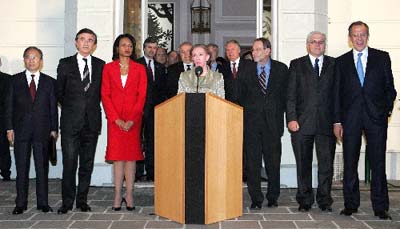
British Foreign
Secretary Margaret Beckett (C) addresses the media during a news briefing in the
British residence in Vienna yesterday. Major world powers yesterday agreed
on a package of incentives for Iran to halt sensitive nuclear fuel work, as well
as penalties if it does not, Beckett told reporters. (Xinhua/Reuters)
World powers yesterday reached consensus on a package of incentives to
get Iran to halt nuclear enrichment, including an offer to suspend sanctions
against it in the United Nations Security Council.
The meeting over Iran's nuclear issue, attended by foreign ministers of the
United States, Britain, France, Russia and China -- five UN Security Council
permanent members -- as well as Germany, part of the "EU3" that conducted
stalled talks with Iran over its nuclear program, ended at the British embassy
at midnight on Thursday.
"We have agreed on a set of far reaching proposals as a basis for discussions
with Iran," British Foreign Secretary Margaret Beckett told a press conference.
The international community would provide Iran with a package of incentives,
"which would bring significant benefits," if Iran gives up its current uranium
enrichment activities, she said without giving details.
Before the meeting, diplomats said the incentives were expected to include a
light-water nuclear reactor and a foreign supply of atomic fuel for Iran so
Tehran would not need to enrich uranium itself.
"We are prepared to resume negotiations" with Iran, if "Iran resumes
suspension of all enrichment related and reprocessing activities and we would
also suspend action in the Security Council," Beckett said.
"We believe they (the proposals) offer Iran the chance to reach a negotiated
agreement based on cooperation," she added.
Beckett urged Tehran to respond positively to the proposals to avoid facing
UN Security Council penalties.
US Undersecretary of State for Political Affairs Nicholas Burnstold reporters
that Washington was "very satisfied" with the agreement.
"We consider it a step forward in our quest to deny Iran a nuclear weapons
capability," Burns said.
US officials said the package would be presented to Iran within days and
Tehran would have only "weeks" to answer.
"Senior representatives from the six nations made certain progress over
Iran's nuclear issue at the meeting due to international diplomatic efforts," a
diplomat, who attended the gathering, told Xinhua.
"It also indicated the will that all sides involved expect to solve Iran's
nuclear problem through negotiations," he added.
The meeting was a follow-up to the May 24 London talks, at which
representatives of the six nations failed to reach a consensus on the measures
to be taken if Iran rejected to halt its uranium enrichment activities.
Meanwhile, crude oil futures extended their losses and ended sharply lower on
Thursday, falling below 71 U.S. dollars a barrel,as market anxiety about a
U.S.-Iran confrontation continued to ease.
The United States, claiming Iran is secretly developing nuclear weapons under
the cover of what Tehran says a peaceful effort to generate electricity, said on
Wednesday that it could join the negotiations between the European Union and
Iran with preconditions.
As a response, Iranian officials said earlier on Thursday they were open to
negotiations but rejected the U.S. condition to suspend all nuclear enrichment
activities.
"We will not give up our nation's natural right (to enrichment),we will not
hold talks over it. But we are ready to hold talks over mutual concerns,"
Iranian Foreign Minister Manouchehr Mottaki said in Tehran.
Iranian officials have indicated Tehran might be willing to limit itself to
research-scale work using only a small number of centrifuges, the machines that
spin uranium gas in order to refineit.
But the U.S. position, reiterated by a senior State Department official
Thursday, was that even one centrifuge is too much, otherwise Iran will acquire
the "break-out" capability for making nuclear weapons.



